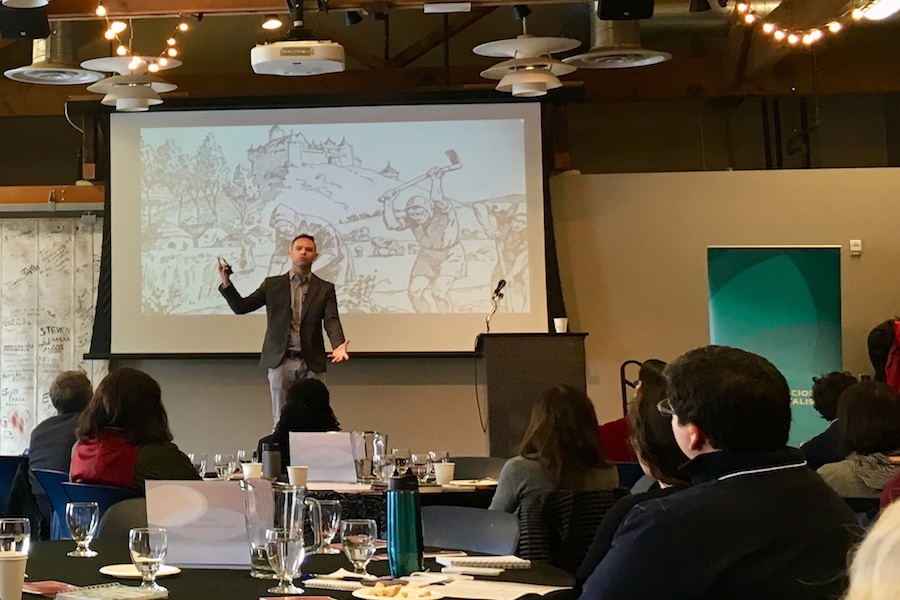At Portland’s conscious capitalism conference, tech CEOs positioned themselves at the forefront of the social benefit movement.
The tech industry dominated a conference hosted yesterday at the EcoTrust building by Conscious Capitalism, an organization that promotes ethical business.
“Right now they’re a bright shiny object in terms of the economy,” said Skip Newberry, CEO of the Technology Association of Oregon, referring to technology companies in an afternoon panel discussion with tech CEOs. “Every company is seemingly becoming a tech company. Those companies must figure out what role they want to play in society.”
Related Story: Cyberpunk author Neal Stephenson predicted the future of retail
Five years ago, Newberry recalled meeting with D.C. politicians for whom tech conjured images of Silicon Valley skateboarders making modest ad revenue off candy crush-type games. Tech had to fight for access to capital.
Now virtually every company styles itself as a tech venture, and many of their leaders think they are changing the world. Tech companies went from fighting for legitimacy to dominating the paradigm, although there are signs of a backlash — the pushback against fake news, the downfall of Uber CEO Travis Kalanick and concerns over the disconnectedness of the smartphone generation.
These concerns were muted during yesterday’s conference, which struck the tone of a religious revival. Speakers traced the arc of capitalism from the dawn of man to the invention of the Internet to the founding of Google. Companies that focus on social benefit, conscious capitalism co-founder Raj Sisodia reminded the audience, reap rewards in the form of reduced legal, management and marketing costs and gains in employee satisfaction.
Arthur Woods, who spearheaded Youtube’s education division, pitched “purpose profiles” from his startup, Imperative. Ryan Carson, CEO of coding education startup Treehouse, described his efforts to diversity the tech industry by sending Latinx coders through his alternative to traditional four-year college.
Jill Nelson played a video promoting her company Ruby Receptionists, in which her receptionists reported euphoric levels of job satisfaction. One said he couldn’t wait for the moment just before thousands of customer calls roll in—because it’s just so exciting to be a part of something so big that changes so many peoples’ days.
Marcus Estes, CEO of the startup Chroma, which connects companies to online sources of capital, was a font of techno-optimism in the panel discussion. With the rising tide of automation, he said, “there are no more than five or ten years left of human truck drivers.” Perhaps someday, he mused, the entire American public will invest in the national GDP through some sort of mega-index fund.
His company is exploring blockchain and initial coin offerings to engage younger generations skeptical of traditional finance tools.
Related Story: The Oregon Business Broadcast, Episode Two: What in the World is Blockchain?
These startups make real differences in the lives of real people. Low-income and minority Treehouse graduates go to work at Nike. Customers feel better after talking to receptionists at Ruby. Companies get expanded access to capital through Chroma. Movements like ethical coding and radically redesigned office spaces offer real value to society.
Yet cracks are appearing in the shiny promise of tech. This month’s cover story of Wired magazine brought renewed scrutiny to Facebook and its disruption of the news industry. The company’s executives, Wired notes, were blinded to the misuse of their technology. The social network designed to connect people lost sight of people through relentless techno-optimism.
How the new skepticism will shape social benefit companies remains to be seen. Perhaps startup executives will temper their grand pronouncements by recognizing change takes place slowly and that achieving positive social outcomes doesn’t always mean throwing out all of the old in favor of the new. Do we really not need college anymore?
Related Story: Higher education, disrupted
Newberry did poke fun at the tech industry’s grandiose proclivities. He joked about employee satisfaction initiatives, workplaces with beer and ping pong tables that have engendered parodies like the HBO show, Silicon Valley. In the end, he suggested, the most successful tech companies need more than software to succeed.
“They embrace tech,” Newberry said of the companies at the conference, “but also keep it centered on people first.”





